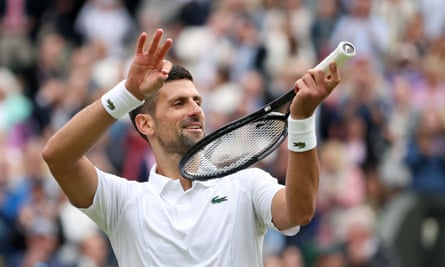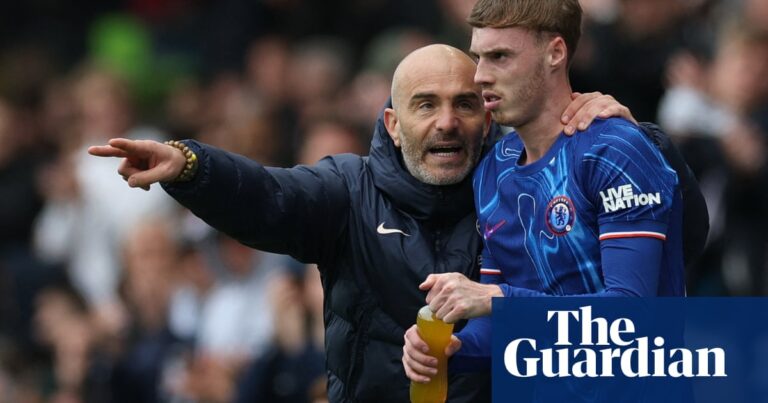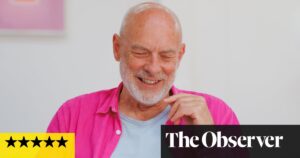Greatness doesn’t come easily. It takes dedication, discipline, perseverance and brilliance to establish oneself at the top of a sport. For Carlos Alcaraz, a second Wimbledon title on Sunday would mean a fourth grand slam in the bag and at the age of 21, it would set him well on the way towards becoming an all-time great. For Novak Djokovic, the 37-year-old stands on the verge of a record 25th grand slam title, a mark that may never be beaten. History is on the line.
Sunday’s clash is a repeat of last year’s final, when Alcaraz denied Djokovic in a five-set thriller. Twelve months on, the Spaniard can become only the sixth man in the Open era to win Roland Garros and Wimbledon back to back. Djokovic, meanwhile, will move ahead of Margaret Court in the list of all-time slam winners and equal Roger Federer with the men’s record of eight Wimbledon titles.
Amid the drama of whether Djokovic would even make it to the start line after his knee surgery in the second week of the French Open, to fix a torn meniscus, the chase for 25 has been strangely overlooked. But its importance, in tennis terms and in the Djokovic mind, should not be understated. This is what he has been chasing for much of his career.
In the recently published book Searching for Novak, the Man Behind the Enigma, the author, Mark Hodgkinson, quotes Dusan Vemic, who was part of the Djokovic coaching team for several years. “Novak’s dad [Srdjan] wouldn’t shy away from stating publicly that Novak, when he was just a boy, was going to be the greatest of all time,” Vemic said.
It was in 2010, when Djokovic led Serbia to their first Davis Cup triumph, that he also believed. At the time, with Federer and Rafael Nadal rampant, it seemed outlandish. Not now. “I felt wind in my back,” he said. “I felt like I had wings after that because bringing the first Davis Cup to Serbia ever was something extremely special, in front of our crowd in Belgrade.
“After that, I probably had one of if not the best season of my life. Won 40-plus matches in a row, three slams out of four. That’s really where I became a different player, I would say. That’s where I started believing that I deserved to be on the top, that I can be better than Federer, Nadal.”

At 37, Djokovic has defied time and expectations. He looked a little shaky in the first couple of rounds but has improved with every match to the point, he says, that he no longer worries about the knee. His motivation, too, is clear.
“I’m aware that Roger holds eight Wimbledons [and] I hold seven,” he said. “History is on the line. Also, the 25th potential grand slam. Of course, it serves as a great motivation, but at the same time it’s also a lot of pressure and expectations. Every time I step out on the court now, even though I’m 37 and competing with the 21‑year‑olds, I still expect myself to win most of the matches, and people expect me to win, whatever, 99% of the matches that I play.
“Of course I’m aware of what’s on the line. It always is really. Any grand slam that I play, there’s always history now on the line. I will try to use that as a fuel to play my best tennis.”
He will need to because Alcaraz is high on confidence after his win in Paris. The Spaniard has won all three of his slam finals and, like Djokovic, has improved as the tournament has progressed. Free from the forearm injury that dogged him in the early part of the clay‑court season, he is able to unload with his ferocious forehand.
He is also 16 years younger than Djokovic, the biggest age gap in a slam final since Jimmy Connors beat a 39-year-old Ken Rosewall at Wimbledon and the US Open 50 years ago, the victor turning 22 during the latter. Djokovic would be the oldest slam winner in the Open era and leads their head to head 3-2, but Alcaraz will draw on last year.
“I know how it’s going to feel playing against Djokovic,” he said. “I’ve played him a few times in grand slams, finals of Masters 1000s. I know what I have to do. I’m sure he knows what he has to do to beat me. It’s going to be a really interesting one, but I’m ready to take that challenge and I’m ready to do it well.”
Source: theguardian.com


















